(English Medium)
Academic Year: 2024-2025
Date: April 2025
Advertisements
- Answers to this Paper must be written on the paper provided separately.
- You will not be allowed to write during first 15 minutes.
- This time is to be spent in reading the question paper.
- The time given at the head of this Paper is the time allowed for writing the answers.
- Section A is compulsory. Attempt any four questions from Section B.
- The intended marks for questions or parts of questions are given in brackets [ ].
The loop of Henle lies in ______.
Medulla
Cortex
Pelvis
Ureter
Artery
Chapter: [0.032] The Excretory System (Elimination of Body Wastes)
The antiseptic present in tears is ______.
Iodine
Hydrogen peroxide
Lysozyme
Lysosome
Chapter: [0.033] Nervous System and Sense Organs [0.034] Sense Organs
Assertion (A): The foetus respires but does not breathe.
Reason (R): The maternal blood supplies oxygen to the foetus through placenta.
A is True and R is False.
A is False and R is True.
Both A and R are True.
Both A and R are False.
Chapter: [0.035] The Reproductive System
During ventricular systole, the atrioventricular valves (P) ______ and semilunar valves (Q) ______.
P - Close, Q - Open
P - Close, Q - Close
P - Open, Q - Close
P - Open, Q - Open
Chapter: [0.031] The Circulatory System
The two cerebral hemispheres are joined by a sheet of fibres called ______.
Pons
Corpus luteum
Hypothalamus
Corpus callosum
Chapter: [0.033] Nervous System and Sense Organs
The onset of menstruation in a human female is called ______.
Menopause
Menarche
Ovulation
Oogenesis
Chapter: [0.035] The Reproductive System
Assertion (A): Rods and Cones are photoreceptors in the sclera of eyeball.
Reason (R): Rods are sensitive to dim light.
A is True and R is False.
A is False and R is True.
Both A and R are True.
Both A and R are False.
Chapter: [0.033] Nervous System and Sense Organs [0.034] Sense Organs
Priya tried to match the hormones with their effect on the human body. She tabulated the pairs as follows:
| Hormone | Effect on the body |
| P | Stimulates conversion of Glycogen to Glucose |
| Q | Reabsorption of water by the Nephrons. |
Identify the correct pair of hormones.
P - Insulin, Q - Glucagon.
P - Adrenaline, Q - Oxytocin.
P - Glucagon, Q - Vasopressin.
P - Vasopressin, Q - Adrenaline.
Chapter: [0.034] The Endocrine System
While studying the stages in the evolution of man, a well-developed chin is observed in ______.
Homo habilis
Homo erectus
Homo sapiens
Australopithecus
Chapter: [0.05] Human Evolution
A pair of corresponding chromosomes of the same shape, size and one from each parent is called ______.
Autosomes
Allosomes
Analogous chromosomes
Homologous chromosomes
Chapter: [0.012] Cell Cycle, Cell Division and Structure of Chromosomes [0.013000000000000001] Genetics – Some Basic Fundamentals
Assertion (A): We urinate more in summer.
Reason (R): Sweat glands are more active in summer.
A is True and R is False.
A is False and R is True.
Both A and R are True.
Both A and R are False.
Chapter: [0.032] The Excretory System (Elimination of Body Wastes)
Rahul inserted a hairpin into his right ear to remove ear wax. He felt a sudden sharp pain with loss of hearing. This was due to ______.
Rupture of eardrum
Rupture of vestibule
Rupture of cornea
Rupture of pinna
Chapter: [0.033] Nervous System and Sense Organs [0.034] Sense Organs
Assertion (A): All food chains begin with herbivores.
Reason (R): Green plants are heterotrophs.
A is True and R is False.
A is False and R is True.
Both A and R are True.
Both A and R are False.
Chapter: [0.023] Photosynthesis: Provider of Food for All [0.023] Photosynthesis: Provider of Food for All
A biology teacher asked her students to give two examples of vestigial organs in the human body.
Raj said: Wisdom teeth and Pinna
Sonu said: Body hair and large intestine
Lata said: Vermiform appendix and wisdom teeth
Abhay said: Pinna and Ossicles
Who were correct?
Abhay and Sonu
Sonu and Lata
Raj and Lata
Abhay and Raj
Chapter: [0.05] Human Evolution
During a practical exam, a plant cell in a particular solution was placed under a compound microscope. Students were told to observe the cell and name the tonicity of the solution and mention the process that occurred in the cell.

Isotonic, Endosmosis
Hypotonic, Active Transport
Hypertonic, Endosmosis
Hypertonic, Exosmosis
Chapter: [0.021] Absorption by Roots: The Processes Involved
Name the following:
The basic units of heredity.
Chapter: [0.013000000000000001] Genetics – Some Basic Fundamentals
Name the following:
The undesirable change in the environment leading to its deterioration.
Chapter: [0.06] Pollution
Name the following:
The structure which connects the placenta and the foetus.
Chapter: [0.035] The Reproductive System
Chapter: [0.06] Pollution
Name the following:
The nitrogenous base that pairs with adenine.
Chapter: [0.012] Cell Cycle, Cell Division and Structure of Chromosomes
Given below is the transverse section of the spinal cord. Read the information below the diagram and fill in the blanks:
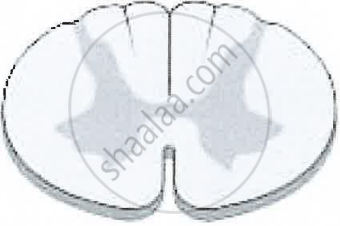
The spinal cord extends from the medulla oblongata of the brain and runs down through the whole length of the vertebral column. The spinal cord is covered by the meninges. It conducts impulses from the skin and muscles to the brain. It also conducts impulses from the brain to the muscles of the trunk and limbs.
The spinal cord is a part of the (a) ______ Nervous System. The grey matter in the picture given above consists of (b) ______ while the white matter consists of (c) ______. The spinal cord is concerned with the (d) ______ actions below the neck. (e) ______ is the bony structure that protects the spinal cord.
Chapter: [0.033] Nervous System and Sense Organs
Arrange and rewrite the terms in the group in the correct order so as to be in a logical sequence, beginning with the term that is underlined.
Apical meristem, Positive phototropism, Auxins, Cell elongation.
Chapter: [0.024] Chemical Coordination in Plants
Arrange the excretory system in the correct sequence.
(Urinary bladder, Ureter, Kidney, Urethra).
Chapter: [0.032] The Excretory System (Elimination of Body Wastes)
Arrange and rewrite the term in the group in the correct order so as to be in a logical sequence, beginning with the term that is underlined.
Auditory canal, Organ of Corti, Stapes, Malleus
Chapter: [0.033] Nervous System and Sense Organs [0.034] Sense Organs
Arrange and rewrite the term in the group in the correct order so as to be in a logical sequence, beginning with the term that is underlined.
Cell membrane, Chromatin fibres, Cell wall, Cytoplasm.
Chapter: [0.011000000000000001] Cell - the Structure and Fundamental Unit of Life [For Revision Only] [0.021] Absorption by Roots: The Processes Involved
Arrange and rewrite the term in the group in the correct order so as to be in a logical sequence, beginning with the term that is underlined.
Lungs, Right auricle, Inferior venacava, Pulmonary Artery.
Chapter: [0.032] The Excretory System (Elimination of Body Wastes)
Advertisements
Read the explanation given below and name the structure:
Food conducting tissue in vascular plants.
Chapter: [0.024] Chemical Coordination in Plants
Read the explanation given below and name the structure:
A cell formed by the fusion of gametes.
Chapter: [0.035] The Reproductive System
Read the explanation given below and name the structure:
The smallest blood vessels in the human body.
Chapter: [0.031] The Circulatory System
Read the explanation given below and name the structure:
A tubular passage that connects the pharynx and the middle ear.
Chapter: [0.033] Nervous System and Sense Organs [0.034] Sense Organs
Name the following:
The openings on the barks of trees through which transpiration occurs.
Chapter: [0.022000000000000002] Transpiration
Given below is a cross section of the human eye. Match the structures marked (a) to (e) with their correct functions:
Example: (f) - 6. Holds the lens in position
| Cross section of Human Eye | Functions | |
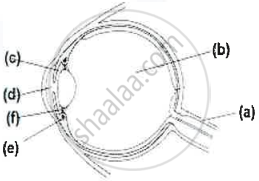 |
1. | Protects retina |
| 2. | Regulates the size of the pupil | |
| 3. | Alters the shape of the lens | |
| 4. | Keeps the lens moist | |
| 5. | Transmits nerve impulses to brain | |
| 6. | Holds the lens in position |
Chapter: [0.033] Nervous System and Sense Organs [0.034] Sense Organs
Explain the term Active transport.
Chapter: [0.021] Absorption by Roots: The Processes Involved
Name the structures through which Transpiration occur in a plant.
Chapter: [0.022000000000000002] Transpiration
Name the following:
The structures through which guttation occurs.
Chapter: [0.022000000000000002] Transpiration
How does the rate of Transpiration differ when there is High temperature?
Chapter: [0.022000000000000002] Transpiration
How does the rate of Transpiration differ when there is High humidity?
Chapter: [0.022000000000000002] Transpiration
Write the overall chemical equation for photosynthesis.
Chapter: [0.023] Photosynthesis: Provider of Food for All
Sam observed a slide containing the lower epidermis of a leaf under a microscope. A number of tiny openings between the epidermal cells were present as shown below in the diagram:
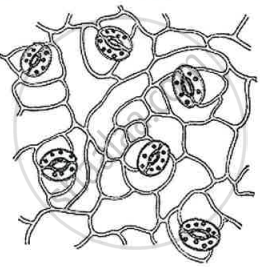
What are these tiny openings called?
Chapter: [0.023] Photosynthesis: Provider of Food for All
Sam observed a slide containing the lower epidermis of a leaf under a microscope. A number of tiny openings between the epidermal cells were present as shown below in the diagram:
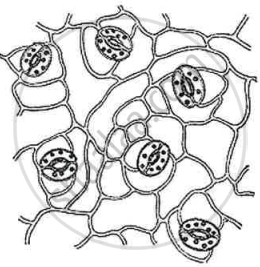
Name the cells that regulate the opening and closing of the structures.
Chapter: [0.023] Photosynthesis: Provider of Food for All
Sam observed a slide containing the lower epidermis of a leaf under a microscope. A number of tiny openings between the epidermal cells were present as shown below in the diagram:
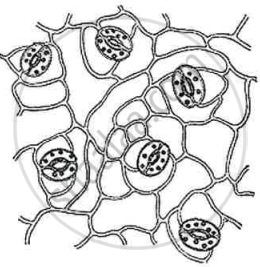
Which ion is responsible for the opening and closing of the openings?
Chapter: [0.023] Photosynthesis: Provider of Food for All
Chapter: [0.034] The Endocrine System
Expand the abbreviation ADH.
Chapter: [0.034] The Endocrine System
Give one example of a diuretic substance.
Chapter: [0.032] The Excretory System (Elimination of Body Wastes)
Mention the significance of the following mineral:
Iodine in our food
Chapter: [0.034] The Endocrine System
Mention the significance of the following mineral:
Magnesium for green plants.
Chapter: [0.023] Photosynthesis: Provider of Food for All
Write any two objectives of Swachh Bharat Abhiyan.
Chapter: [0.06] Pollution
Draw a neat and labelled diagram of Root hair.
Chapter: [0.021] Absorption by Roots: The Processes Involved
Mention one characteristic of roots for absorbing water from the soil.
Chapter: [0.021] Absorption by Roots: The Processes Involved
What is Parthenocarpy?
Chapter: [0.024] Chemical Coordination in Plants
Give one example of Parthenocarpy.
Chapter: [0.024] Chemical Coordination in Plants
State the difference between Micturition and Parturition.
Chapter: [0.035] The Reproductive System
Give the functions of lymph.
Chapter: [0.031] The Circulatory System
Advertisements
Study the picture given below and answer the question:
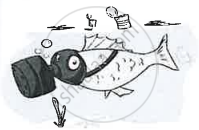
How does water get polluted?
Chapter: [0.06] Pollution
Study the picture given below and answer the question:
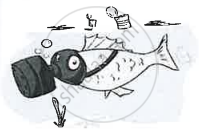
What is the effect of water pollution on human life?
Chapter: [0.06] Pollution
Study the picture given below and answer the question:
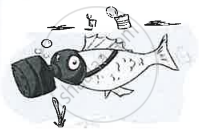
Mention one control measure to stop the pollution of water bodies.
Chapter: [0.06] Pollution
State Mendel’s Law of Segregation.
Chapter: [0.013000000000000001] Genetics – Some Basic Fundamentals
What are tropic hormones?
Chapter: [0.034] The Endocrine System
Give one example of a Tropic hormone.
Chapter: [0.034] The Endocrine System
Differentiate Between Genotype and Phenotype.
Chapter: [0.012] Cell Cycle, Cell Division and Structure of Chromosomes [0.013000000000000001] Genetics – Some Basic Fundamentals
What is the significance of Testes being placed in Scrotal sacs?
Chapter: [0.035] The Reproductive System
Draw a labeled diagram of sperm.
Chapter: [0.035] The Reproductive System
What is the scientific name of the pea plant that Mendel used for his experiments?
Chapter: [0.013000000000000001] Genetics – Some Basic Fundamentals
Mention the surgical method of contraception in men.
Chapter: [0.04] Population
Chapter: [0.04] Population
Name two harmful effects of noise pollution.
Chapter: [0.06] Pollution
Which parts of a plant exhibit Negative geotropism?
Chapter: [0.024] Chemical Coordination in Plants
Which parts of a plant exhibit Positive hydrotropism?
Chapter: [0.024] Chemical Coordination in Plants
Kathak is an Indian classical dance which involves a lot of spinning by the dancers. The learners of this dance experience dizziness in the beginning while spinning.
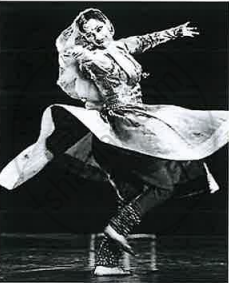
Name the part of the membranous labyrinth responsible for this dizziness.
Chapter: [0.033] Nervous System and Sense Organs
Kathak is an Indian classical dance which involves a lot of spinning by the dancers. The learners of this dance experience dizziness in the beginning while spinning.
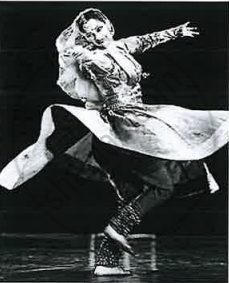
Give a suitable reason for Semicircular canals.
Chapter: [0.033] Nervous System and Sense Organs
Kathak is an Indian classical dance which involves a lot of spinning by the dancers. The learners of this dance experience dizziness in the beginning while spinning.
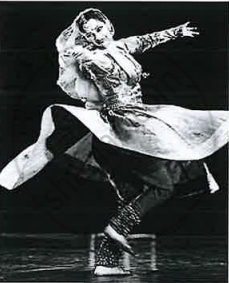
Mention the nerve that carries the impulse for dizziness to the brain.
Chapter: [0.033] Nervous System and Sense Organs
How does transpiration help in the uptake of water from the soil?
Chapter: [0.022000000000000002] Transpiration
The given statement is incorrect. Rewrite the correct statement:
Fresh water fish when placed in hypertonic salt solution absorb water and burst.
Chapter: [0.021] Absorption by Roots: The Processes Involved
The given statement is incorrect. Rewrite the correct statement:
Seminiferous tubules secrete Testosterone.
Chapter: [0.035] The Reproductive System
During Mitosis what is the position of chromatids in metaphase?
Chapter: [0.012] Cell Cycle, Cell Division and Structure of Chromosomes
During Mitosis what is the position of chromatids in metaphase?
Chapter: [0.012] Cell Cycle, Cell Division and Structure of Chromosomes
Chris was watching the display of fireworks in the sky.
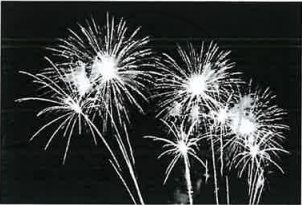
- Trace the path of the light rays using the following terms:
Fovea, Lens, Conjunctiva, Pupil, Cornea. - Name the nerve that carries the impulse for vision to the brain.
Chapter: [0.033] Nervous System and Sense Organs [0.034] Sense Organs
Draw neat and labelled diagrams of Malpighian capsule
Chapter: [0.032] The Excretory System (Elimination of Body Wastes)
Other Solutions
Submit Question Paper
Help us maintain new question papers on Shaalaa.com, so we can continue to help studentsonly jpg, png and pdf files
CISCE previous year question papers ICSE Class 10 Biology with solutions 2024 - 2025
Previous year Question paper for CISCE ICSE Class 10 -2025 is solved by experts. Solved question papers gives you the chance to check yourself after your mock test.
By referring the question paper Solutions for Biology, you can scale your preparation level and work on your weak areas. It will also help the candidates in developing the time-management skills. Practice makes perfect, and there is no better way to practice than to attempt previous year question paper solutions of CISCE ICSE Class 10 .
How CISCE ICSE Class 10 Question Paper solutions Help Students ?
• Question paper solutions for Biology will helps students to prepare for exam.
• Question paper with answer will boost students confidence in exam time and also give you an idea About the important questions and topics to be prepared for the board exam.
• For finding solution of question papers no need to refer so multiple sources like textbook or guides.
